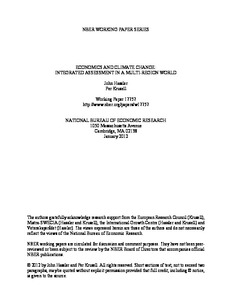Economics and climate change: integrated assessment in a multi-region world
"This paper develops a model that integrates the climate and the global economy---an integrated assessment model---with which different policy scenarios can be analyzed and compared. The model is a dynamic stochastic general-equilibrium setup with a continuum of regions. Thus, it is a full stoc...
| Main Authors: | , |
|---|---|
| Institution: | ETUI-European Trade Union Institute |
| Format: | TEXT |
| Language: | English |
| Published: |
Cambridge, MA
2012
NBER |
| Subjects: | |
| Online Access: | https://www.labourline.org/KENTIKA-19136621124919548039-economics-and-climate-change-i.htm |
| Summary: | "This paper develops a model that integrates the climate and the global economy---an integrated assessment model---with which different policy scenarios can be analyzed and compared. The model is a dynamic stochastic general-equilibrium setup with a continuum of regions. Thus, it is a full stochastic general-equilibrium version of RICE, Nordhaus's pioneering multi-region integrated assessment model. Like RICE, our model features traded fossil fuel but otherwise has no markets across regions---there is no insurance nor any intertemporal trade across them. The extreme form of market incompleteness is not fully realistic but arguably not a decent approximation of reality. Its major advantage is that, along with a set of reasonable assumptions on preferences, technology, and nature, it allows a closed-form model solution. We use the model to assess the welfare consequences of carbon taxes that differ across as well as within oil-consuming and -producing regions. We show that, surprisingly, only taxes on oil producers can improve the climate: taxes on oil consumers have no effect at all. The calibrated model suggests large differences in views on climate policy across regions." |
|---|---|
| Physical Description: | 27 p. Digital |

